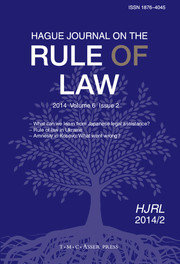Article contents
Rule of Law and Security Sector Reform: Casual Assumptions, Unintended Risks and the Need for Norms
Published online by Cambridge University Press: 26 March 2012
Abstract
This article examines rule of law (ROL) and security sector reform (SSR) linkages in crisis management. In particular, the article looks into why international assistance providers chose to categorize a situation and ensuing response strategy as rule of law or SSR, how this categorization is motivated and explained to international and national partners and stakeholders, and how this categorization affects national laws, institutions and other arrangements in post-conflict and crisis societies. The article is borne out of an observation, based on events in the Arab Spring, that the character of international community responses to rule of law threats and challenges has as a strong focus on security. Rule of law promotion taking place in UN and EU missions has undergone a ‘securitization’ in how reforms are conceived and put into practice, compared with rule of law in development aid and past experiences of rule of law assistance in post-communist transitions.
Keywords
- Type
- Articles
- Information
- Hague Journal on the Rule of Law , Volume 4 , Special Issue 1: Special Issue on Security Sector Reform and Rule of Law , March 2012 , pp. 98 - 119
- Copyright
- Copyright © T.M.C. Asser Press and the Authors 2012
- 4
- Cited by




